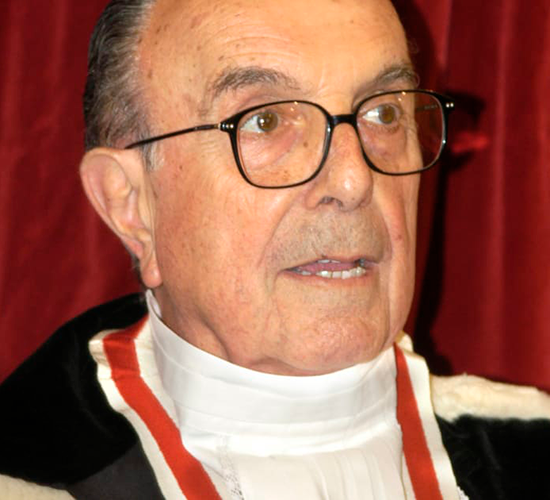In memoriam: Sandro Pontremoli
Sandro Pontremoli, a former rector of the University of Genoa and an honorary member of the American Society for Biochemistry and Molecular Biology since 1984, died in June 2021, the ASBMB learned recently. He was 95.

Born January 20, 1926, in Ferrara, Italy, Pontremoli earned a degree in medicine and surgery at the University of Genoa in 1949. He became an assistant in the university’s Institute of Physiology where his research focused on metabolism, lipids and the role of the pancreas.
In 1957, Arturo Bonsignore invited Pontremoli to join the Institute of Biochemistry at Genoa. Bonsignore had been studying enzymes of glycolytic metabolism and became interested in the recently discovered pentose phosphate pathway, which was found to generate NADPH for reductive cell biosynthesis, and convert 6-carbon sugars into pentoses, or 5-carbon sugars, for the synthesis of nucleotides and nucleic acids.
Bonsignore sent Pontremoli to the National Institutes of Health to work with Bernard Horecker, the biochemist who had discovered this new metabolic pathway. (Horecker was an ASBMB member from 1947 until his death in 2010, and his work on the pentose phosphate pathway was the subject of a 2005 Centenary Classic in the Journal of Biological Chemistry.) This trip to the U.S. marked the beginning of a collaboration that lasted decades, with the two researchers traveling back and forth to each other’s labs. Pontremoli accepted a full professorship at the University of Ferrara in 1963, then moved back to Genoa seven years later. He expanded his work to the study of proteases.
In addition to his research, Pontremoli worked to modernize biochemistry in Italy. He was elected rector, or academic head, of the University of Genoa in 1990 and served in that role for 14 years, opening dialogue with municipal and regional officials and helping to establish the Italian Institute for Technology. He was a member of the Accademia Nazionale dei Lincei, a venerable European scientific institution in Rome, for 30 years.
Giorgio Parisi, president of the Accademia, told an obituary writer (in Italian), “In his long career, (Pontremoli) lived as a protagonist of the glorious biochemistry of the pioneers who discovered the fundamental metabolic pathways, with brilliant intuition strongly linked to chemical knowledge.”
Enjoy reading ASBMB Today?
Become a member to receive the print edition four times a year and the digital edition monthly.
Learn moreGet the latest from ASBMB Today
Enter your email address, and we’ll send you a weekly email with recent articles, interviews and more.
Latest in People
People highlights or most popular articles

From humble beginnings to unlocking lysosomal secrets
Monther Abu–Remaileh will receive the ASBMB’s 2026 Walter A. Shaw Young Investigator Award in Lipid Research at the ASBMB Annual Meeting, March 7-10 in Washington, D.C.

Chemistry meets biology to thwart parasites
Margaret Phillips will receive the Alice and C. C. Wang Award in Molecular Parasitology at the ASBMB Annual Meeting, March 7-10 in Washington, D.C.

ASBMB announces 2026 JBC/Tabor awardees
The seven awardees are first authors of outstanding papers published in 2025 in the Journal of Biological Chemistry.

Decoding how bacteria flip host’s molecular switches
Kim Orth will receive the Earl and Thressa Stadtman Distinguished Scientists Award at the ASBMB Annual Meeting, March 7–10, just outside of Washington, D.C.

Thiam elected to EMBO
He was recognized during the EMBO Members’ Meeting in Heidelberg, Germany, in October.

The timekeepers of proteostasis
Learn about the cover of the winter 2026 ASBMB Today issue, illustrated by ASBMB member Megan Mitchem.
